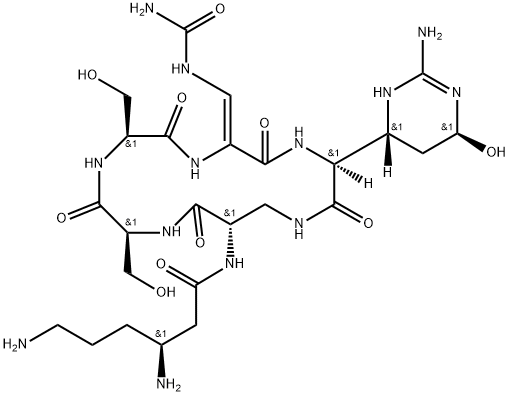Description
Viomycin was found independently in 1951, in the culture broth of Streptomyces puniceus by Pfizer Research Laboratories and in that of S. floridae by Parke Davis Co. It shows strong activity against Mycobacterium species and moderate activity against gram-positive and gram-negative bacteria. Viomycin has been used by intramuscular administration to treat tuberculosis, but because of its ototoxicity and renal toxicity it is being replaced by more active and less toxic drugs, such as enviomycin and other antituberculotic antibiotics.
Originator
Vinactane,Ciba,US ,1953
Uses
Viomycin is a basic peptide antibiotic, which is an effective agent against multidrug-resistant tuberculosis.
Indications
Viomycin is a complex polypeptide antibiotic that is active
against MDR strains of tuberculosis. Cross-resistance
between viomycin and kanamycin is less frequent
than between viomycin and capreomycin.
Definition
ChEBI: A cyclic peptide antibiotic produced by the actinomycete Streptomyces puniceus, used in the treatment of tuberculosis.
Manufacturing Process
Viomycin is produced by inoculating a nutrient medium with a viable strain of
the organism Actinomyces vinaceus. A method for the production of viomycin
is set forth in US Patent 2,663,445 comprising inoculating a medium
containing soy peptone, beef extract, dextrose, sodium chloride and a silicone
antifoaming agent with a spore suspension of Actinomyces vinaceus and
incubating the inoculated medium for 120 hours at a temperature of 26°C
while passing sterile air through the medium at a rate of 500 ml per liter of
medium per minute.
brand name
Viocin
Sulfate (Pfizer).
Therapeutic Function
Antitubercular
Biological Activity
Member of the tuberactinomycin family of antibiotics . Inhibits group I intron splicing and prokaryotic protein synthesis. Freezes bacterial ribosomes in either the pre- or post-translational state. Facilitates trans -cleavage of the Neurospora VS ribozyme.
